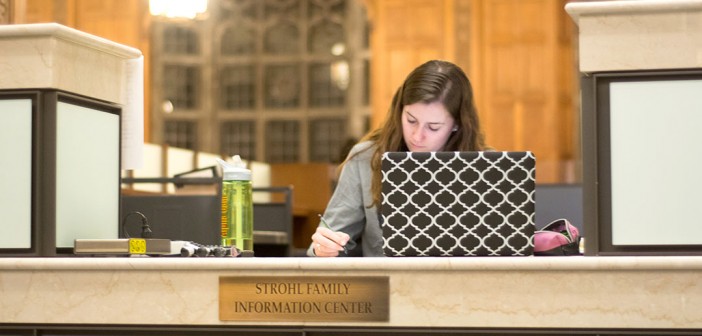
Megan Kozar, ’17, studies for her exams while working at the help desk in Linderman Library on Wednesday, March 2, 2016. Some students use wage jobs to supplement work study. (Roshan Giyanani/B&W Staff)
A change in Lehigh’s policy on work study made by Lehigh’s Office of Financial Aid has limited the number of jobs students can have, forcing some students to find a second wage job off campus to make up for the lost potential earnings.
Work study is a federally funded student employment program in which students can earn money at an on-campus job for costs not billed by Lehigh, like books or other personal expenses. Before the policy changed, students could work multiple work-study positions to earn their maximum amount awarded in their financial aid package. Wages range from $7.25 to $10 per hour, according to the Office of Financial Aid’s website.
The policy shift is because of students who earned more than their allotted amount of aid. When a student has more than one work-study job, it is difficult for supervisors to monitor how much money students are earning, according to Joann Deppert, the Office of Financial Aid’s assistant director and work-study program coordinator.
“(Employers) have no way of knowing how much the student is earning for any position other than the one they are employing the student in,” Deppert wrote in an email.
Under federal regulations, students are not permitted to earn more than their work-study allotment, and having more than one job can make this more likely to occur, Deppert wrote. If this happens, the student’s hiring department has to fund the cost of the overage directly, or the student’s financial aid will have to be reduced.
Deppert wrote the policy change was intended to decrease the likelihood of these circumstances.
The Office of Financial Aid staff encourages student employment supervisors to provide enough hours so students can earn a full allotment — but for some, the policy change means they have to find a second job without the help of the work-study program.
Daphnee McMaster, ’16, went abroad last year, only to return to the new work-study rules. One of her positions offered her a wage salary, instead of being a part of work study, but had to cut back her hours to accommodate students in the same position. She said she is lucky to have been offered enough hours by her work-study position to fill her financial aid allotment, but that the change created a problem for other students.
Deppert wrote that her office can help if a student does not up have the aid they need. If students are unable to earn their full financial aid allotment, they can reach out to the Office of Financial Aid and request permission to hold two positions. Each student’s situation is unique, she noted, and those situations will be reviewed on a case-by-case basis.
For instance, if students held two positions in a previous year and did not exceed their work study earnings, and if both supervisors will be aware of the student’s other job, both positions may be approved. Or if students can find two positions offering limited hours, they may be approved for both.
“If the student feels as if their allocated amount is not sufficient to meet their out of pocket expenses, we would suggest that they seek employment from an office that hires wage earners rather than a work-study position,” Deppert wrote.






Comment policy
Comments posted to The Brown and White website are reviewed by a moderator before being approved. Incendiary speech or harassing language, including comments targeted at individuals, may be deemed unacceptable and not published. Spam and other soliciting will also be declined.
The Brown and White also reserves the right to not publish entirely anonymous comments.